Why, despite investments in firewalls, DLP and antivirus solutions, do companies still fall victim to cybercriminals? The answer lies in weaknesses in business processes and non-obvious vulnerabilities that cannot be identified without a comprehensive security assessment.
Read the material to the end; you will get not only answers to the most pressing questions but also a clear strategy to improve your company’s security.
Basic rules of security audit
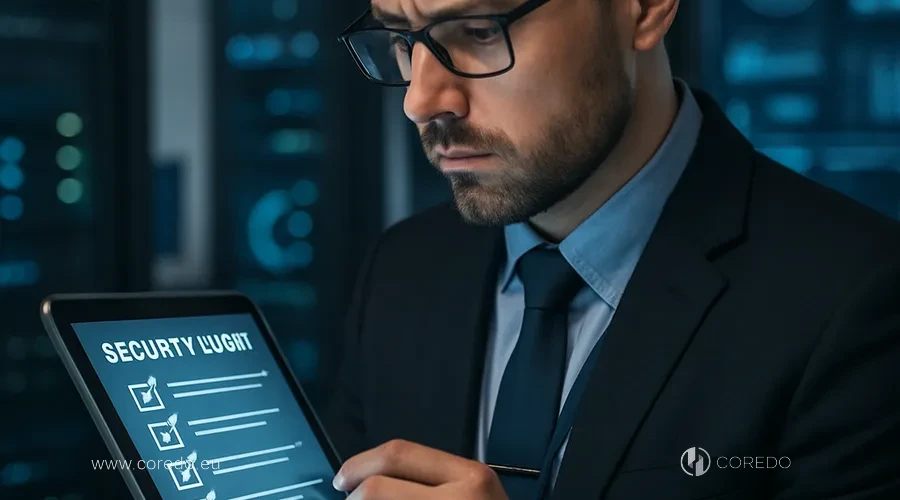
At COREDO we proceed from the view that any rules of a security audit should be built on three key principles: confidentiality, integrity and availability of data (CIA triad). This triangle underpins international standards ISO 27001, SOC 2, PCI DSS and GDPR, which define requirements for information protection in the EU, Asia and the CIS.
COREDO’s practice confirms: an effective security assessment is impossible without strict adherence to a compliance audit, a procedure aimed at confirming that a company’s internal policy complies with international and national regulatory requirements.
For example, in the EU it’s GDPR, in the United Kingdom: the UK Data Protection Act, in Singapore – PDPA. Importantly, legal support during a security audit becomes an integral part of the process: it allows correct interpretation of regulators’ requirements, minimizes the risk of fines and ensures transparency for shareholders and partners.
In each project the COREDO team adapts the rules of the security audit to the specifics of the industry, the scale of the business and regional standards. This approach makes it possible not only to identify technical vulnerabilities but also to eliminate organizational and legal gaps that often cause incidents.
Thus, COREDO’s systemic approach to security audit provides comprehensive protection of the business at all levels: from technologies to legal aspects, which is especially important when preparing for the next stages of inspection.
Company security audit: methods and stages
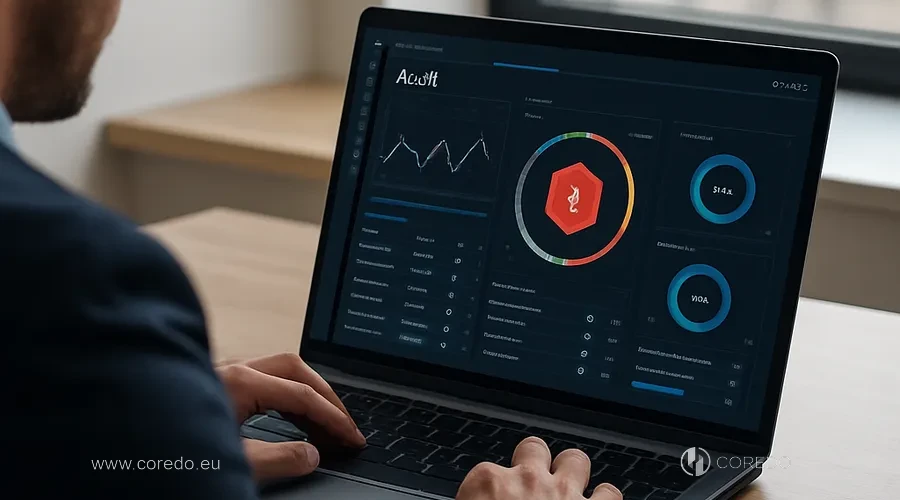
This approach gives an objective picture of the company’s security posture.
Classification of SEO methods
- An internal security audit is conducted by company employees or engaged specialists familiar with internal processes. It is effective for regularly assessing compliance with policies and procedures.
- An external security audit is performed by independent experts, which allows obtaining a fresh perspective and identifying vulnerabilities that may have been missed internally.
- Automated audit – using vulnerability scanners, SIEM systems, and monitoring tools for rapid assessment of a large number of systems.
- Manual audit – in-depth analysis of specific processes, business logic, assessment of the human factor and non-standard scenarios.
Stages of a comprehensive security audit
- Planning and preparation: defining objectives, scope and criteria for the security assessment. At this stage COREDO develops an individual audit plan taking into account industry and regional specifics.
- Information gathering and vulnerability assessment (Vulnerability Assessment): analysis of IT infrastructure, business processes, access policies, penetration testing (penetration testing), identification of weak spots.
- Analysis and evaluation of security risks: correlating identified vulnerabilities with potential threats and business risks, prioritizing corrective measures.
- Documentation and reporting: preparing a report with detailed descriptions of the problems found, assessment of their criticality and recommendations for remediation.
- Corrective actions and monitoring: implementing measures to eliminate vulnerabilities, regular monitoring of the effectiveness of changes.
In conditions of remote work and distributed IT infrastructure, security auditing of cloud services, VPNs, remote access tools and privilege control becomes especially important. The solutions developed at COREDO allow effective adaptation of security audit processes for hybrid and international teams.
Internal and external security audits: what you need to know?
Internal security audit addresses the tasks of regular monitoring of policy enforcement, identifying procedure violations and employee training. It is especially useful for companies with developed internal expertise and a mature information security management system.
External security audit is necessary for independent assessment, obtaining an objective opinion for shareholders, investors or regulators, as well as when preparing to obtain financial licenses (for example, crypto, forex, payment services). The COREDO team has repeatedly conducted external audits for European and Asian companies entering new markets or integrating with international partners.
COREDO’s practice shows that regular security checks of partners minimize the likelihood of incidents related to external integrations.
Tools for security audit
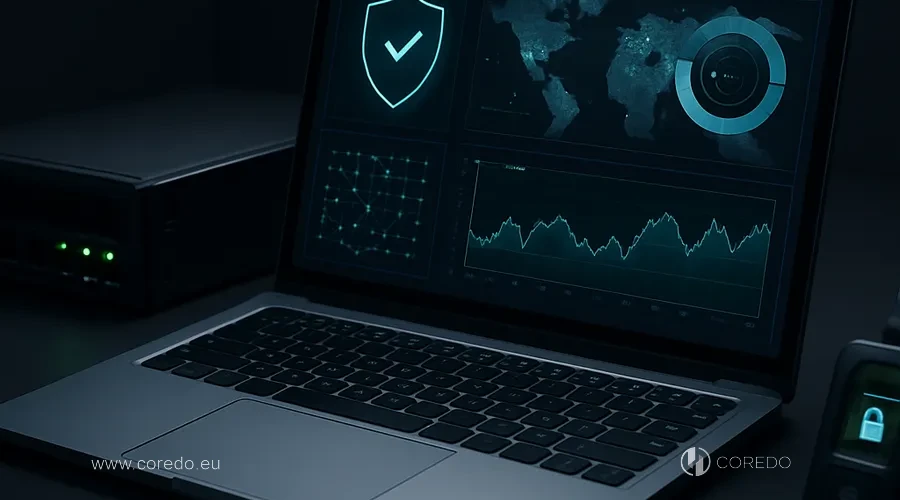
A modern security audit is impossible without specialized tools and technologies. At COREDO we use a comprehensive approach, combining SIEM systems (Security Information and Event Management), vulnerability scanners (for example, Qualys, Nessus), user activity monitoring systems and audit automation.
The choice of tools depends on the scale of the business:
- For small businesses, cloud solutions with automated reports are sufficient.
- Medium companies implement SIEM and integrate vulnerability scanners.
- Large international groups use customized platforms with support for multi-tenant and distributed analytics.
The key challenge is scaling security audit processes as the company grows. COREDO’s solutions provide phased tool implementation, which allows adapting the security audit to the expansion of IT infrastructure without losing effectiveness.
Compliance audit: compliance with international standards
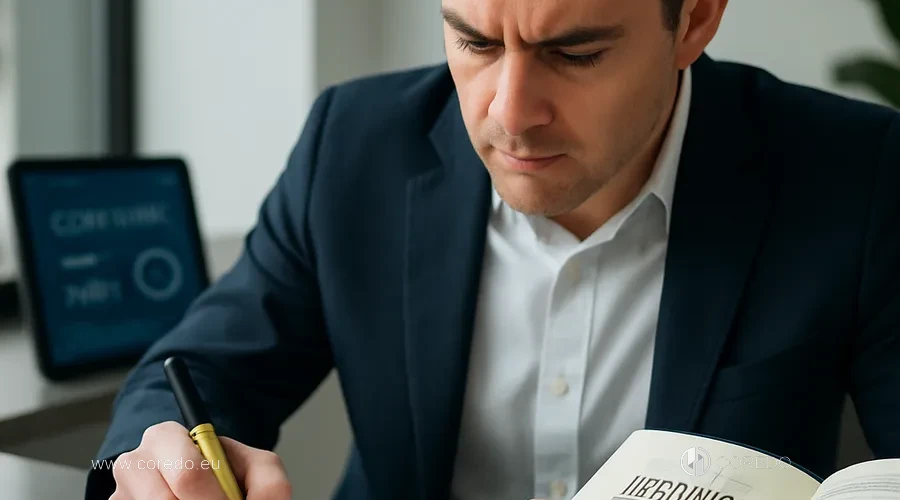
In the EU and the UK, special attention is paid to compliance with GDPR requirements; in Asia, to local data protection laws (for example, PDPA in Singapore).
Preparing a company for a security audit requires not only technical but also legal expertise. The COREDO team supports clients at all stages: from analyzing corporate policies to interacting with regulators. This approach makes it possible to avoid fines and preserve reputation even in the event of an incident.
Special attention is paid to the registration of EU legal entities and obtaining financial licenses: these processes are impossible without undergoing a compliance audit and confirming compliance with international standards (ISO 27001, SOC 2, PCI DSS). At COREDO we develop individual roadmaps for audit preparation, taking into account industry specifics and regional requirements.
Effectiveness of security audit and impact on business ROI
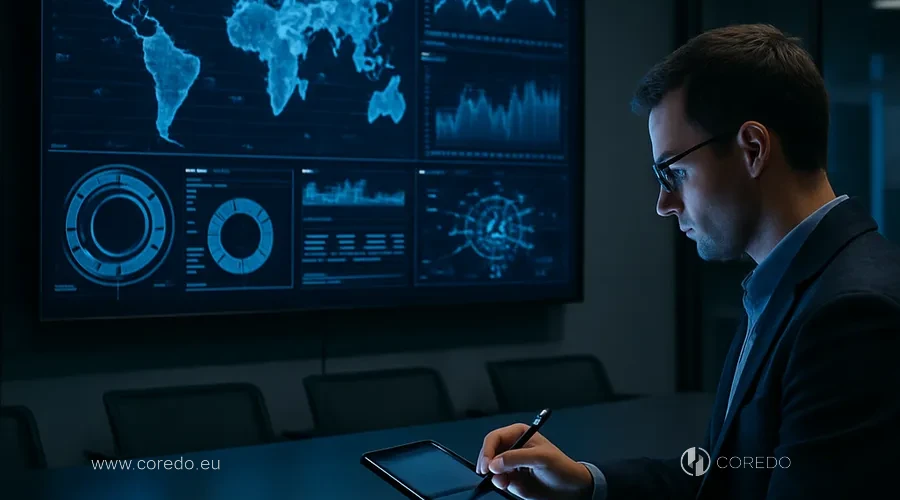
The assessment of the effectiveness of a security audit is built on key metrics: the number of identified and remediated vulnerabilities, incident response speed, level of standards compliance, reduction in incidents after implementing recommendations. At COREDO we use integrated dashboards to track trends and provide transparent reporting to management.
The impact of a security audit on business ROI is expressed in direct savings: prevented incidents, reduced response costs, increased trust from clients and partners. Integrating audit results into the risk management strategy not only minimizes threats but also increases the company’s investment appeal.
Thus, the security audit becomes an integral part of the risk management strategy and a guarantee of the organization’s sustainable development: practical recommendations for conducting it are provided below.
Practical tips for conducting a security audit
Practical tips for conducting a security audit help companies not only identify weaknesses in their protection systems but also organize processes in accordance with international standards. For large international organizations, it is especially important to integrate best audit practices to ensure reliability and uninterrupted operation across different countries and jurisdictions.
How to organize a security audit in an international company?
- Appoint persons responsible for information security at each regional level.
- Use the best methodologies (ISO 27001, NIST, CIS Controls) and adapt them to the specifics of your business.
- Implement regular employee training processes to reduce the impact of the human factor.
- Plan the audit taking into account company growth and distributed IT infrastructure.
- Integrate the security audit into the overall risk management system using automated tools for data collection and analysis.
The impact of the human factor on employee training
Regular training, phishing simulations and access control significantly reduce the likelihood of successful attacks.
Frequency of conducting an SEO audit and scaling
It is recommended to conduct a comprehensive security audit at least once a year, and also after significant changes in IT infrastructure or business processes. For fast-growing companies, COREDO implements phased scaling of the audit, which allows timely identification of new risks.
Incident management and response
This ensures not only rapid restoration of operations but also minimization of damage to the business.
Security audit in Europe, Asia and Africa
Each region imposes its own requirements on security audits. In the EU, GDPR and ISO 27001 standards dominate, in Asia, local data protection laws, in Africa – national regulations, often less formalized but requiring special attention to legal aspects.
COREDO’s solutions take these nuances into account, as evidenced by successful cases of registering legal entities and obtaining licenses in various jurisdictions.
Key takeaways and steps for business
- Organizing and conducting a security audit – a strategic task requiring a systematic approach, adaptation to international standards and consideration of regional specifics.
- Minimizing risks and increasing the company’s security level is possible only by integrating audits into risk management processes, regular staff training and the use of modern tools.
- Legal support and choosing reliable partners, such as COREDO,: the guarantee of successfully passing a compliance audit and protecting business interests at the international level.
- Control and continuous improvement of security processes must become part of corporate culture, not a one-off initiative.
By implementing the best practices of security audits, you not only protect assets and reputation but also create a foundation for long-term growth and trust from clients, partners and regulators.